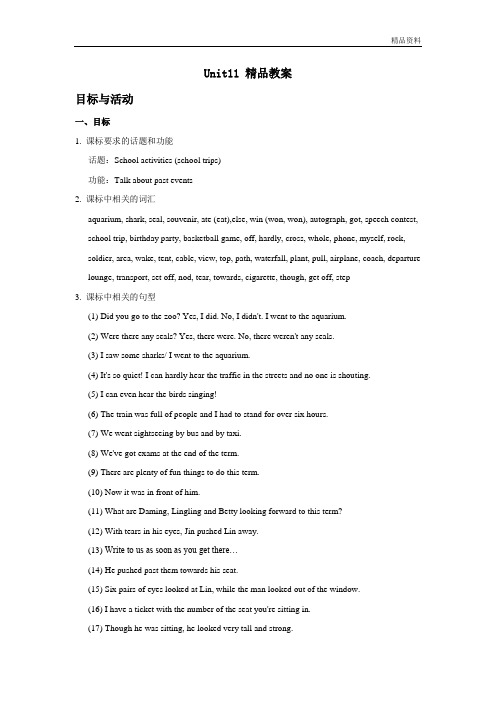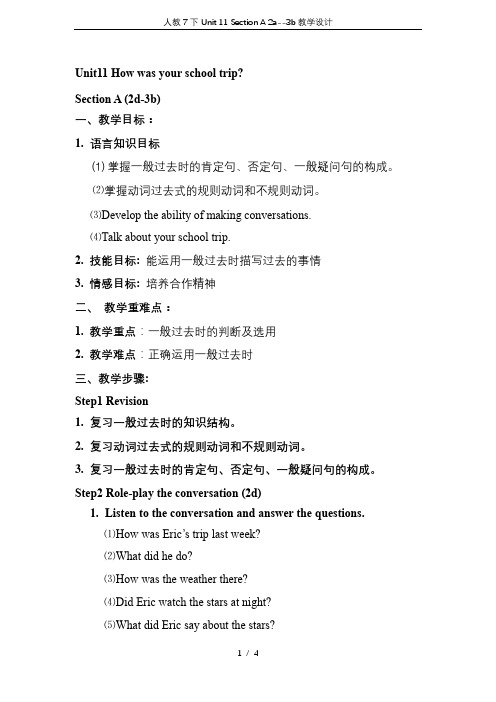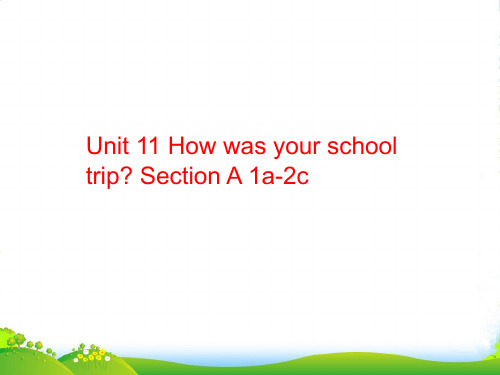人教7下Unit11SectionA(1a-2d)教案
[学海风暴]2015-2016学年人教版七年级下教学课件Unit11Howwasyourschooltrip1a-2d
![[学海风暴]2015-2016学年人教版七年级下教学课件Unit11Howwasyourschooltrip1a-2d](https://img.taocdn.com/s3/m/85068b32e87101f69e31957d.png)
3. Words and Expressions
(1) milk, cow, horse, feed, farmer, quite, anything, grow, farm, pick, excellent, countryside (2) milk a cow(给奶牛挤奶), ride a horse(骑马), feed chickens(喂鸡), quite a lot (of...)(许多), in the countryside(在乡下;在农村)
2. Did Carol take any photos? 卡罗尔拍照片了吗? take photo/picture拍摄;摄影。表示“拍摄
某物或人”,要在短语后面接介词“of”引入所 拍摄的对象。
The girl likes to take photos of herself with her
cell phone. 那女孩喜欢用手机自拍。
Peter: Hi, Eric. How was your trip last week? Eric: It was excellent. I visited my grandparents in the
countryside. Peter: Oh, nice. What did you do? Eric: I went fishing every day. And I fed the chickens with
PART Ⅰ
P R E V I EW
1. Key Points Talk about past events.
【最新】人教版七年级英语下册Unit11 精品教案

Unit11 精品教案目标与活动一、目标1. 课标要求的话题和功能话题:School activities (school trips)功能:Talk about past events2. 课标中相关的词汇aquarium, shark, seal, souvenir, ate (eat),else, win (won, won), autograph, got, speech contest, school trip, birthday party, basketball game, off, hardly, cross, whole, phone, myself, rock, soldier, area, wake, tent, cable, view, top, path, waterfall, plant, pull, airplane, coach, departure lounge, transport, set off, nod, tear, towards, cigarette, though, get off, step3. 课标中相关的句型(1) Did you go to the zoo? Yes, I did. No, I didn't. I went to the aquarium.(2) Were there any seals? Yes, there were. No, there weren't any seals.(3) I saw some sharks/ I went to the aquarium.(4) It's so quiet! I can hardly hear the traffic in the streets and no one is shouting.(5) I can even hear the birds singing!(6) The train was full of people and I had to stand for over six hours.(7) We went sightseeing by bus and by taxi.(8) We've got exams at the end of the term.(9) There are plenty of fun things to do this term.(10) Now it was in front of him.(11) What are Daming, Lingling and Betty looking forward to this term?(12) With tears in his eyes, Jin pushed Lin away.(13) Write to us as soon as you get there…(14) He pushed past them towards his seat.(15) Six pairs of eyes looked at Lin, while the man looked out of the window.(16) I have a ticket with the number of the seat you're sitting in.(17) Though he was sitting, he looked very tall and strong.(18) Even if it's only ten minutes, you should move.4. 语法(1) 规则动词和不规则动词的一般过去式(2) 一般过去时的一般疑问句,肯定句和否定句(3) 利用直接引语和间接引语转述现在进行时的陈述句、疑问句和祈使句二、活动1. Warming up(1) a. Ask students if they will have a school trip, what they want to do. Help students thinkout as many activities as they can and write the activities on the blackboard. (brain storm)b. Question: Did you do these activities last school trip? So we can say I did... last school trip.(Help students to change the verbs into the past form. And practice the simple past formsentences. )(2) 复习上节课的内容,复述课文,听写单词等2. 游戏(1) 看一看,猜一猜操作方法:①将班级学生分成小组形式,指定小组负责人。
人教7下Unit 11 Section A 2a--3b教学设计

Unit11 How was your school trip?Section A (2d-3b)一、教学目标:1.语言知识目标⑴掌握一般过去时的肯定句、否定句、一般疑问句的构成。
⑵掌握动词过去式的规则动词和不规则动词。
⑶Develop the ability of making conversations.⑷Talk about your school trip.2. 技能目标: 能运用一般过去时描写过去的事情3. 情感目标:培养合作精神二、教学重难点:1. 教学重点:一般过去时的判断及选用2. 教学难点:正确运用一般过去时三、教学步骤:Step1 Revision1.复习一般过去时的知识结构。
2.复习动词过去式的规则动词和不规则动词。
3.复习一般过去时的肯定句、否定句、一般疑问句的构成。
Step2 Role-play the conversation (2d)1.Listen to the conversation and answer the questions.⑴How was Eric’s trip last week?⑵What did he do?⑶How was the weather there?⑷Did Eric watch the stars at night?⑸What did Eric say about the stars?2. Read aloud the conversation.3. Listen again and fill in the blanks.Step3 Complete Jim’s and Bill’s letters (3a)1. Fill in the blanks.2. Read the two letters.3. Look at the pictures and fill in the blanks.4. Answer the questions according to 3a.⑴ Who wrote the first letter?⑵ Why did he write the letter?⑶Who wrote the second letter?⑷ What did he write about?Step 4 Talk about your school trip.1. What did you do on your school trip?2. PairworkWork in pairs. Ask your partner about your school trip.3. GroupworkWork in groups and then give a report.Step 5 Summary一般过去时be 动词He wasn’t at home yesterday. He was at home yesterday. Was he at home yesterday ? Yes, he was. / No, he wasn’t.Step 6 ExercisesStep 7 Blackboard DesignUnit11 How was your school trip?Section A (2d-3b)Where did you go on your school trip?How did you go there? How was the weather?What did you do there?How was your school trip?Step 8 Homework1. 熟记动词变过去式的规则和不规则动词(见课本p141)。
新人教版七年级英语下册unit11全单元分课时课件(共129张ppt)

观察与思考
Bob: Hi, Carol. How was your school trip yesterday? Carol: It was great!
Bob: Did you go to the zoo?
Carol: No, I didn’t. I went to a farm. Look, here are my photos.
What do you do? What do you do? Feed some chickens. Feed some chickens.
Talk with a farmer. Take some photos. Take some photos.
How wasschyouorl stcrhipoo学l t校r旅ip行?
went for a walk
My last trip
milked a cow
My last trip
rode a horse
My last trip
fed chickens
My last trip
talked with a farmer
My last trip
took some photos
___ Did you grow any apples?
√ ___ Do they grow apples?
___ Did you eat them?
___ Were they good?
√
2b Listen again. Circle T for true or F
for false.
1. The farmer showed Carol around the farm.
Bob: Did you ask him any questions?
人教版七年级英语下册 Unit11 Section A(1a-2d)预习-训练案

9.我有一匹相当不错的马。 I have ____q_u_i_te__a_g_o_o_d_______ horse. =I have ___a_v_e_r_y_g_o_o_d_____horse. 四、一般过去时的用法
How was your school trip? 这句话运用了1.__一__般__过__去____ 时态。
4.昨天李先生带我们参观了他的工厂。 Yesterday Mr.Li __s_h_o_w_e_d__u_s_a_r_o_u_n_d__________his factory. 5.我在科学博物馆看到了很多东西。 I saw ___q_u_it_e__a_l_o_t _(o_f__th_i_n_g_s_)____ at the science museum.
思考探究
一、anything和something的意思和用法 anything是复合不定代词,一般用于1.__疑__问________句和 2.__否__定________句中。something常用于3._肯__定_________ 句 中,或在表示委婉地邀请、请求、建议或希望得到肯定回 答的4.__疑__问________句中。复合不定代词修饰形容词时,形 容词要放在不定代词的5.__后__________(前/后)面;当它们作 主语时,谓语动词要用6.__单__________(单/复)数。
表示程度。quite 一般放在不定冠词a/an 3.___前____(前/后)面, 而very放在a/an 4.___后_____(前/后)面。
5.I didn't have ___a_n_y_th__in_g_______ (something /anything) to tell you. 6.I want to give you __s_o_m_e_t_h_in__g_b_e_a_u_t_if_u_l_ (一些漂亮的东西). 7.Would you like __s_o_m_e_t_h_in__g__(something/anything) to eat? 8.我喂了一些肉给狗吃。 I ___f_e_d_______some meat ___t_o________ the dog. =I __f_e_d________the dog ___w_i_t_h______some meat.
人教版七年级下册英语Unit 11 课时1 Section A (1a-2d)

14 D
5 excellent
10 fishing
15 B
基础巩固练
能力提升练 答案呈现
16 inthecountryside 17 Did; see;quitealot
21 E 26 B 22 D 27 D
18 goforawalk
23 B 28 D
19 rode; horseon
24 C 29 A
12.—Excuseme, lookatthesign(指示牌)“NoSwimming”! —Sorry. I______it. A. sawB. see C. didn’tseeD. doCn’tsee
【点拨】由Sorry可知是刚才没看到,现在知道了, 因此用一般过去时的否定形式。
13.—Isthere_____A_Icandotohelpyou? —No, thanks. Icandoitmyself. A. anythingB. nothing C. everythingD. something
B:Wehadlunchunderanoldtree. A. We took many
Andthenwewentswimming.
photos.
24______ A:Ihadabusyday. C
B. Where did you have lunch?
B:25______
C. How was your
anything
4. Thechildrenare___p_i_c_k_in__g(摘)
strawberrieswiththeirparents.
5. Marystudiesveryhardandsheisan_________(优秀的)
student.
人教版英语七年级下册课时练习 Unit 11 Section A 1a - 2d (含答案)
Unit 11How was your school trip?第1课时[Unit 11 Section A1 1a2d] Ⅰ.写出下列动词的过去式A组1. look________2. play________3. sound ________4. miss ________B组5. like ________6. live ________7. hope ________ 8. use ________C组9. stop ________ 10. shop ________D组11. ride ________ 12. do ________13. go ________ 14. take ________15. feed ________ 16. are ________17. is/am ________ 18. have ________Ⅱ.根据汉语提示,完成下列单词的拼写19.My uncle is a ________(农民). He works on a big farm.20.In his town, each family has at least three ________(奶牛).21.It was dark outside. She couldn't see ________(任何东西) clearly. 22.—What did your brother do on the farm?—He ________(喂养) chickens.23.Last year, they ________(种植) lots of flowers along the road.Ⅲ.用括号内所给单词的适当形式填空24.Carol ________(take) photos on the farm last week.25.________ you________(see) Mr. Zhang just now?26.Jim ________(get) up at half past six yesterday morning.27.Bill ________ (be not) at home last Sunday.28.They ________(grow)strawberries from December to June every year.29.My brother ________(study) for the math test last night.30.At first, Marco wanted ________ (visit) his uncle, but he ________ (stay) at home at last. 31.Did you go ________(fish) with your father last weekend?32.I ________(not do) my homework last Monday.33.Did you do ________ (something) interesting yesterday?Ⅳ.根据汉语意思完成句子,每空一词34.昨天那位农民带领学生们参观了农场。
人教七年级下册Unit 11How was your trip_ 导学案
【课后巩固】I. 填入适当的词。
1. She often ____ (go) to the park on weekends, but yesterday she ____ (go) to the zoo.2. Last week she ___ (have) fun on a farm.3. What ___ they __ (do) on the school trip?They ____ (ride) horses and _______ (climb) the mountains.4. How ____ their school trip? It ___ interesting.(be)___ she __ (go) fishing? Yes, she did.5. ___ Li Ming ____ (pick) any strawberries? No, he didn’t.II. 翻译下列句子。
1. 我们在那儿爬山, 看到了很多花。
2. 我们在树下吃了午餐,之后又玩游戏。
3. 太阳半小时前又出来了。
4. 昨天我们担心天会下雨。
5. 几分钟前,天变阴了。
6. 你拍了一些照片吗?III. 完成下列句子。
1. Lucy did her homework at home.(改否定句)Lucy ______ __ her homework at home.2. His father worked all day last Monday.(改一般疑问句)____ his father _____ all day last Monday?3. I was very busy last week. (改否定句和一般疑问句)I ______ very busy last week._____ you very busy last week?4. There was some orange in the cup.(变一般疑问句)_____ there ____ orange in the cup?I.时态大考验((写出下列动词的过去式))1. visit____________2.climb______________3. pick_______________4. grow___________5.draw ____________6. ask _______________7.study ___________8.learn ______________9. can_______________ 10. buy ___________ 11.teach______________ 12.eat_______________ II. 阅读In England, people don’t talk to each other when they travel. If you get on a bus, or in a train, you will sometimes see people sitting and looking out of the window. Other people will be reading books or newspapers.When you meet English people, they often begin a conversation by talking about the weather. So when you meet somebody in England, you can say, “Nice weather for the time of the year!”“But it was a little cold yesterday,” somebody may answer.“But it will get a little warmer later,” you can say.Talk like this, and the English will think, “How friendly you are!”( ) 1. English people often ___________ on the bus.A. talk a lotB. talk to each otherC. read newspapers ( ) 2. When you meet an English people, you can begin the conversation by talking about the __________.A. weatherB. timeC. food( ) 3.According to the passage, if you talk to English people about the weather, they will think you are ___________.A. English.B. rightC. friendly( ) 4. Which sentence is true?A. English people like traveling by bus.B. English people are unfriendly.C. English people don’t talk much when they’re by train.【课后巩固】I. 翻译下列短语和句子。
- 1、下载文档前请自行甄别文档内容的完整性,平台不提供额外的编辑、内容补充、找答案等附加服务。
- 2、"仅部分预览"的文档,不可在线预览部分如存在完整性等问题,可反馈申请退款(可完整预览的文档不适用该条件!)。
- 3、如文档侵犯您的权益,请联系客服反馈,我们会尽快为您处理(人工客服工作时间:9:00-18:30)。
Unit11 SectionA(1a-2d)教案 【教材版本与册数】新目标人教版七年级下册
【单元名称】Unit 11 How was your school trip? 【课时】Section A 1a-2d (第1课时) 【课型】Listening and Speaking(听说课) 教材分析 【本单元话题】本单元围绕“学校组织的游览活动”这一话题,展开形式多样的听、说、读、写学习活动。 【本单元重点掌握目标】教学的重点是与农场和乡村生活相关的动词短语,还有be动词和实义动词的一般过去式。 【教材内容拆分分析】Section A部分围绕着学校组织的农场之行展开,着重描述乡村生活。围绕学生的所见所闻开展听说活动,呈现一般过去时的陈述句、一般疑问句、特殊疑问句和相关答语等。 【通过本单元的学习学生需掌握哪些综合技能】通过本单元的学习使学生学会谈论各自的游览经历为背景,展开多种形式的语言训练活动,目的是让学生逐步学会运用一般过去时态叙述和询问过去的活动经历。 教学目标 1. 语言知识目标: 1). 学习并熟练掌握下列单词或短语。 milk, cow, horse, feed, farmer, quite, anything, grow, farm, pick, milk a cow, ride a horse, feed chickens, 2). 学习并熟练掌握下列句型,谈论过去的事件。 A:How was your school trip? B: It was great! A:Did you see any cows? B:Yes, I did. I saw quite a lot. A:Did Carol ride a horse? B:No, she didn’t. But she milked a cow. A:Were the strawberries good? B:Yes, they were. / No, they weren’t. 3).通过听前的词汇分类与听中聚焦关键信息,学生能掌握该听力策略。 4). 通过听后深度挖掘听力信息任务的设置和文本再构,学生能进一步去判断并思考表达观点,发展了口语技能。 2. 情感态度价值观目标: 此部分的学习内容贴近学生的学习生活,通过学校旅行的记述,培养学生关心集体、奉献他人的高尚品质。鼓励学生积极参加课外活动,热爱农村,服务农村,多体验农场的各项工作。 3.文化素养目标: 通过学习,学生了解国内外学校组织的各种游览活动。 教学重难点 1. 教学重点: 1) 掌握本节课的新单词、词组。milk, cow, horse, feed, farmer, quite, anything, grow, farm, pick, milk a cow, ride a horse, feed chickens, go for a walk ,take photos 2) 学会使用句型Did you…? Yes, I did./No, I didn’t. Did she/he…? 3)正确运用一般过去时。 2. 教学难点: 1) 动词过去式。 2)使用一般过去时的句型向其他同学描述自己做过了的事情。 建议教法 情景交际法,任务型教学法,听说课的“3P”教学模式 : P--呈现(语言输入) P--操练(1.机械操练2. 听力训练) P--运用(语言输出) 设置情景意义操练 设计听后活动任务,先模仿再迁移 总结,听后设置任务提升学生语言运用能力 教学评价 1.本课时的目标设计清晰可操作,活动的设计紧扣目标要求并与目标达成一致。 2.听中的活动设计遵循语言规律,由易到难逐层递进,充分体现语言输入到语言输出的完整过程。 3.听后的活动设计体现对文本内容的深度挖掘和文本再构,体现了对学生思维品格的训练与培养。
【本课时教学设计】 步骤 过程 措施(教师活动与学生活动) 目的 持续性评价 1 预备与激活先期知识 Step 1 Warming -up 1. Greeting
Who is on duty today ? Who was on duty yesterday ? What is the weather like today ? What was the weather like yesterday ? 2 .Song : Play the song “ Old MacDonald had a farm” and have Ss find out the animals in the song
Get Ss answer like this : On the farm ,there are some ducks,
1. 通过问题设置,学生复习已学知识。以旧促新,引出一般过去时。 2. 由歌曲带动学生学习兴趣。 学生是否能用已经学过的词汇回答问题 cats,chickens, cows pigs,dogs and horses . They are animals. 2 获取新知 Step 2 Pre-listening 1. T: Show a picture and tell Ss: Yesterday Carol went to the farm.What did she do on the farm? S1: She milked a cow. S2: She … 2. S:Work on 1a. Look at the picture in 1a, match the words with the pictures. Then check the answers. Keys: 1.e 2.b 3.a 4.c 5.f 6.d 3.T:Check the answers. Try to read and recite the verbs and their respondent past form. (go-went, milk-milked, ride-rode, feed-fed, talk, talked, take-took)
1. 教授核心句型 A:Did you see any cows? B:Yes, I did. I saw quite a lot. A:Did Carol ride a horse? B:No, she didn’t. But she milked a cowt? 2. 教授核心词汇milk, cow, horse, feed, farmer, quite, anything, grow, farm, pick, milk a cow, ride a horse, feed chickens 3. 通过书上练习巩固所学词汇。 1. 学生是否能够认读核心词汇。 2. 学生是否能够通过练习进一步熟悉目标词汇。
Step 3 While listening 1. T: Ask the students to listen to the conversation and fill in the blanks in the picture. S: Listen and circle the three things Carol did on her school trip in 1a. T:Check the answers. 1. 通过听力练习,达到语言输入的目的。 2. 听第一遍完成教材基本要求,听第二遍提高难度,要求学生用本课目标词汇及句型完成回答问题。 3. 通过听音模仿,加大语言输入量以及强 1. 通过听力检查学生是否能听懂目标词汇与基本句型。 2. 学生是否能用目标词汇回答问题。 Keys: milked a cow, went for a walk, talked with a farmer 2. T: Ask thestudents to listen to the conversation and pay attention to the pronunciationandintonation.
化语音语调学习。 3. 学生是否能通过听音模仿朗读课文。
Step 4 Post- listening T: Let’s practice the conversation with your partner. S: Ss practice the conversation like this. A: Did Carol take any photos? B: Yes, she did .
1. 学生通过反复模仿原文对话,巩固目标语言。
2. 利用所学目标词汇,自己创编新的对话,拓展学生词汇及语言能力。
学生是否能够通过反复朗诵课文,用目标词汇和语言创编新的对话。
3 深度加工知识 Step 5 Before listening 1. T: Write the sentence structure: —What did you do… ? — I … 2. T: Ask the students to make their own conversations. Show the following. —What did you / he / she / they do last weekend / last
结合之前所学的形容词,将其带入本课 目标句型,进行目标句型学习与操练。 —What did you do… ? — I played… 1. 学生是否能够通过学习目标句型,利用所学过的形容词朗读目标句型。
2. 学生是否可以通过反复练习掌握目标句型。 3. 学生是否可以
